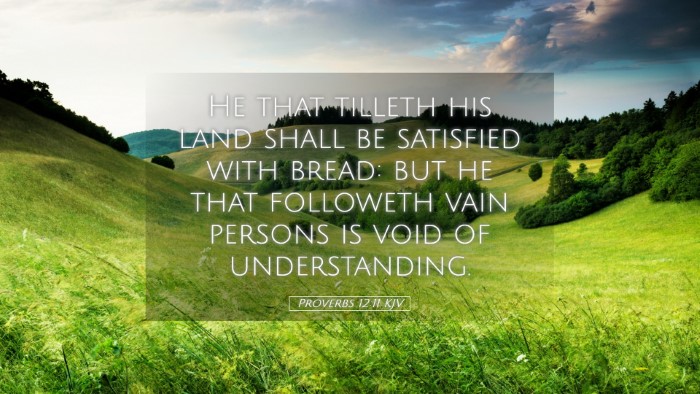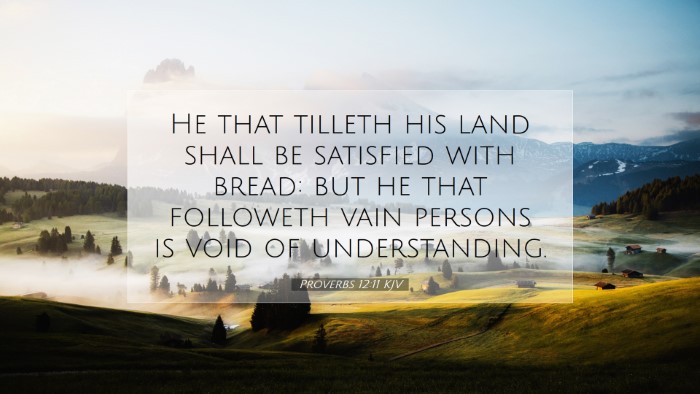Commentary on Proverbs 12:11
Proverbs 12:11 reads: "He who tills his land will be satisfied with bread; But he who follows frivolity is devoid of understanding."
Introduction
This verse presents a dichotomy between diligent labor and frivolous pursuits. It underscores the value of hard work and the consequences of being idle or engaging in unproductive activities. The insights derived from various public domain commentaries provide a deeper understanding of this proverb and its applications.
Insights from Matthew Henry
Matthew Henry emphasizes the importance of industriousness: "He that labours in his vocation, even in the meanest employment, shall find it to his advantage." He conveys that diligence in one's work, especially in the agricultural context of tilling the land, brings satisfaction and sustenance. Henry further explains that God's provision follows human effort, hinting at the theological principle that while God is sovereign, human responsibility in labor is equally valued.
Additionally, Henry contrasts the diligent worker with the one who indulges in frivolity, stating that those who are "devoid of understanding" are ultimately left wanting. He elucidates the folly of neglecting work for the sake of temporary pleasure, indicating that such pursuits lead not only to material loss but also to spiritual emptiness.
Insights from Albert Barnes
Albert Barnes relates the significance of agricultural metaphors in the ancient Near Eastern context. He notes: "In a land primarily sustained by agriculture, the metaphor of tilting one's land is particularly telling." Barnes points out that the reward of bread signifies not just physical nourishment but also the satisfaction derived from honest labor. This implies that wealth generated through hard work carries with it a sense of fulfillment and integrity.
Furthermore, Barnes draws attention to the idea of 'frivolity', explaining its broader implications as aimlessness or chasing after empty pleasures. He suggests that the pursuit of frivolity often leads individuals away from useful and constructive endeavors, leading to a lack of understanding of life's true priorities. Through this, Barnes encourages readers, especially students and scholars, to seek meaningful pursuits as they reflect on their vocational and spiritual journeys.
Insights from Adam Clarke
Adam Clarke provides a detailed exegesis of the verse, focusing on the concept of contentment achieved through labor. He notes that "The man who applies his heart and hand to useful work will reap the rewards of his diligence." Clarke emphasizes the importance of recognizing the divine order that aligns effort with reward.
In his commentary, Clarke contrasts this pursuit of labor with the 'following of frivolity,' suggesting that those who indulge such distractions are akin to those who have lost sight of their purpose. He emphasizes that true understanding comes through engaging in productive work rather than engaging in vain pursuits. Clarke's insights serve as a call to introspection for readers, inviting them to evaluate their pursuits in light of their ultimate goals and God’s design for their lives.
Theological Implications
The theological insights from these commentaries converge on several important points:
- Divine Provision: The verse encapsulates the idea that while God provides, it is through diligent labor that one can experience His blessings. This principle may be explored as part of a broader theological narrative concerning work and faith.
- The Nature of Understanding: Understanding is presented not as mere intellectual knowledge but as wisdom manifesting through one’s actions. Engaging in meaningful work fosters deeper understanding and connection with God's purposes.
- Fruitfulness in Labor: The agricultural metaphor underscores that hard work results in 'fruit'—be it physical sustenance or personal growth, marking a clear distinction between the reward of industriousness and the emptiness of frivolous distractions.
Application for Today
For pastors, students, theologians, and Bible scholars, this verse urges examination of personal pursuits in both vocational and spiritual contexts. The call to diligence resonates through various aspects of life:
- Personal Responsibility: Encourage congregations and communities to embrace their roles in society, understanding that effort is rewarded and is a reflection of their faith in action.
- Critical Reflection: Invite individuals to assess their engagements critically. Are they investing time in pursuits that bring fulfillment or are they drawn towards distractions that yield frustration and emptiness?
- Teaching and Mentoring: Highlight the importance of teaching younger generations the value of hard work and its spiritual implications—thus fostering a culture where diligence is embedded within the community.
Conclusion
Proverbs 12:11 serves as a timeless reminder of the principles of labor and understanding. Through insights from Matthew Henry, Albert Barnes, and Adam Clarke, it is evident that diligence is rewarded, not just materially but spiritually. As believers, the challenge lies in prioritizing efforts that align with God’s design, fostering a life program dedicated to productive pursuits over frivolous distractions.


